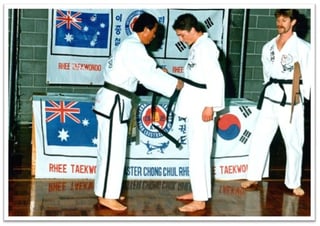The number one fear leaders have is being ‘found out’ and having their incompetence uncovered. It’s called the impostor syndrome. If you are experiencing this, you are not alone.
As a kid, I had mild dyslexia, and it made me feel stupid. School was punishing. Even right through my twenties and thirties, whatever I did, I often feared being found out as a fake. I felt like an impostor. I was never enough.
To “remedy” this, I focused on achieving things.
So I signed up for taekwondo and was awarded a black belt. I joined athletics clubs and won a state title.
I earned a law degree. When I started working, I quickly rose up the ranks in the corporate world — from office junior to account exec, to account manager, to account director, to group account director, and ultimately CEO.
But it didn’t matter at what level I was performing at. I still felt stupid, and I still felt like a fake, and I was still unsatisfied with what I had. My drive to achieve came from a need to prove my self-worth and a need to keep up the façade of my achievements to the world.
So how does this syndrome affect others and especially our businesses?
Impostor syndrome frequently shows up when it’s big decision time — with the consequences of unnecessary deliberations, inappropriate delegation, or worst of all, ongoing second-guessing.
All this may sound overly dire, especially because we are managing businesses and people — but don’t worry, there are solutions.
How to Conquer Impostor Syndrome
1. Realise the power of perspective
The real issue here is not having impostor syndrome. It’s thinking that no one else does. That was my main issue — I thought I was the only person suffering. The truth is, just about every successful person has had it in one way, shape, or form in their journey. It’s normal. It’s human. It’s just part of life. It’s just not talked about.
2. Stop the self-judgement
Marty Seligman’s work talks about how people create learned helplessness via their adopted narrative style. The goal here is we shouldn’t make negative thoughts or events personal, permanent, or pervasive as these three ultimately fuel impostor syndrome.
The essence of beating impostor syndrome is separating your judgements from your self-worth. Understanding that your self-worth should be, and is, a constant. Without judgement, we can grant ourselves permission to be who we are. Outcomes don’t make us more or less valuable. Once we’re able to do this, we are free to bring our best to any situation.
3. Focus on wisdom rather than results
Focus your attention on inputs, not outcomes. Next time you find yourself in a situation where you’re focusing more on the result, try to shift your attention back to what you will or have learned
By stopping the collection of successes and failures and rather shifting to the seeking of wisdom, the game shifts. Suddenly our heads are not thinking about the future and focused on fear — but on the present, in the moment, which means we’re now able to perform at the level we should.
It also really helps to surround ourselves with people who may have experienced what we’re going through. I’m fortunate to have found myself many friends and mentors through networks like Entrepreneurs’ Organization and The Executive Connection. These are forums of honesty, where I can be who I am and learn from other people’s wisdom.
4. Be aware of yourself and learn your triggers
Beating impostor syndrome is a practice, not a silver bullet. Being aware of the situations and the nature of the thoughts that challenge me lets me ‘observe’ impostor syndrome rather than being affected by it by not making myself wrong for negative thoughts, but coming back to my power to focus back to what I’m doing with my best self. As when I’m 100% in the moment, that doesn’t leave room for second-guessing.
Over time, impostor syndrome still comes to visit occasionally, but only as fleeting and passing thoughts. I now no longer suffer from it. With practice, I’m now able to get back to my best, back to the moment, and really just enjoy whatever I’m doing.
Coming Out on Top
Remember, you are not alone. So stop judging yourself. Rather, change your perspective and seek wisdom instead of looking at your achievements. Exercise your analytical self-awareness — you will soon realise that this is something you have control over. Practice and repeat.
Leaders need to be on top of their game, to be the best versions of themselves all the time, not just when they feel like it. Interestingly now, I teach business leaders and rising stars the operating system for leadership in the age of disruption. It’s called Powerful Presence. For me, this was the ultimate test case in getting myself, and my impostor syndrome, out of the way so I can be a meaningful contribution for others.

Will your leadership skills get you and your business ahead of the curve? Visit our Powerful Presence page to know more.









